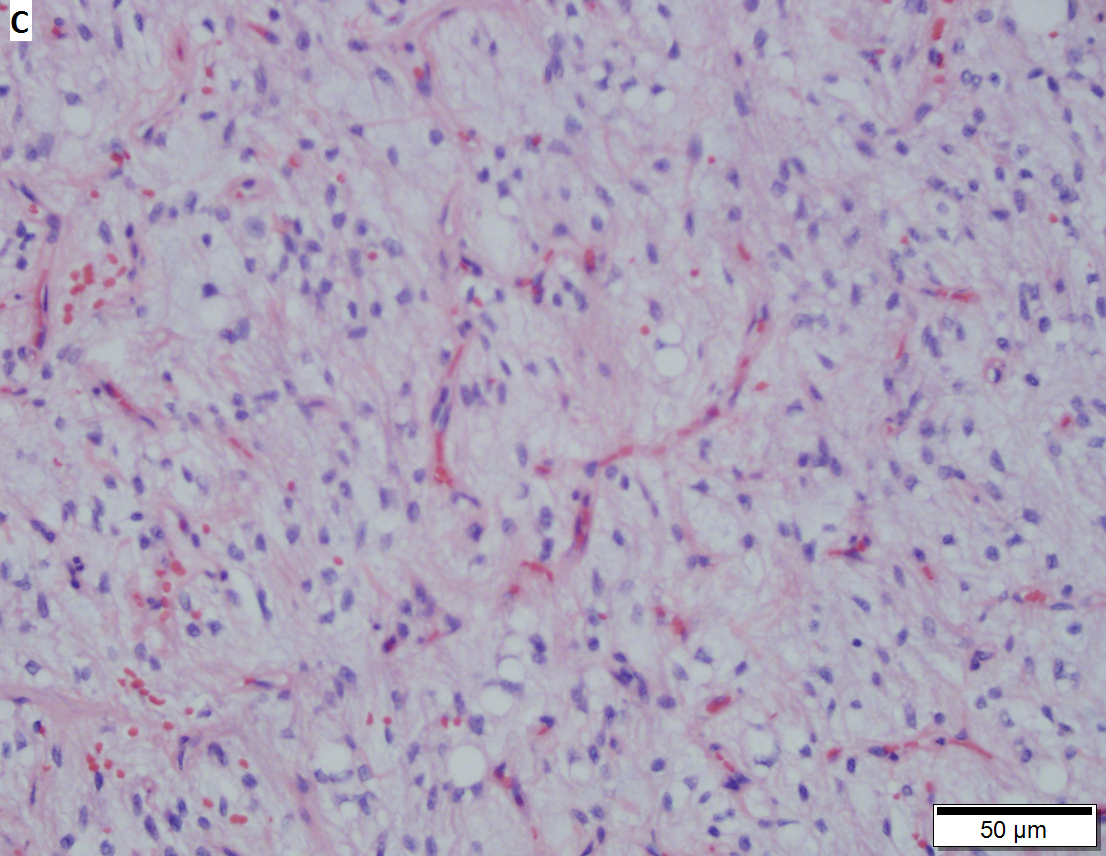Difference between revisions of "Adipocytic tumours"
m |
|||
| Line 103: | Line 103: | ||
===General=== | ===General=== | ||
*May be syndromic - typically [[autosomal recessive]].<ref name=pmid25671454>{{cite journal | | *May be syndromic - typically [[autosomal recessive]].<ref name=pmid25671454>{{cite journal |authors=Garib G, Siegal GP, Andea AA |title=Autosomal-dominant familial angiolipomatosis |journal=Cutis |volume=95 |issue=1 |pages=E26–9 |date=January 2015 |pmid=25671454 |doi= |url=}}</ref> | ||
*Can be seen in the context of [[Birt–Hogg–Dubé syndrome]].<ref name=pmid8734663>{{cite journal | | *Can be seen in the context of [[Birt–Hogg–Dubé syndrome]].<ref name=pmid8734663>{{cite journal |authors=Chung JY, Ramos-Caro FA, Beers B, Ford MJ, Flowers F |title=Multiple lipomas, angiolipomas, and parathyroid adenomas in a patient with Birt-Hogg-Dube syndrome |journal=Int J Dermatol |volume=35 |issue=5 |pages=365–7 |date=May 1996 |pmid=8734663 |doi=10.1111/j.1365-4362.1996.tb03642.x |url=}}</ref> | ||
*[[Painful skin lesion]]. | *[[Painful skin lesion]]. | ||
Revision as of 22:27, 9 October 2021
Adipocytic tumours fall into the grouping soft tissue lesions and includes things that are very common (e.g. lipoma) and everything from benign to malignant.
Overview
This grouping includes a number of tumours, which can be divided based on their behaviour into benign, intermediate and malignant.
Benign
Benign adipocytic tumours:[1]
- Lipoma.
- Angiolipoma.
- Myolipoma.
- Pleomorphic lipoma/spindle cell lipoma.
- Lipomatosis.
- Lipomatosis of nerve.
- Lipoblastoma.
- Extrarenal angiomyolipoma.
- Extra-adrenal myelolipoma.
- Hibernoma.
Intermediate
Intermediate adipocytic tumours:[1]
- Atypical lipomatous tumour.
Malignant
Malignant adipocytic tumours:[1]
- Dedifferentiated liposarcoma.
- Myxoid liposarcoma.
- Pleomorphic liposarcoma.
- Mixed-type liposarcoma.
- Liposarcoma NOS.
Detail section
Normal mature fat
Microscopic
Features:
- Adipocytes of approximately equal size.
- Not vascular.
- No nuclear hyperchromasia.
Notes:
- May have nuclear pseudoinclusions (Lockhern cell).[2]
- There is some suggestion this is not benign.[3]
IHC
- S-100 +ve.
Lipoblastoma
General
- Rare paediatric tumour.[4]
Usual presentation:[4]
- Painless neck mass.
Microscopic
Features:
- Nests of cells in the dermis with abundant pale cytoplasm - vaguely resemble adipocytes.
- Smaller than mature adipocytes.
DDx:
Images:
Lipoblastoma like tumor
Lipoblastoma like tumor in 26 yo woman, tumor of pelvis. A. Lobulated appearance at low power. B. Cytologically bland lipoblasts with a myxoid stroma. C. Numerous thin-walled branching blood vessels. D. Loose collagenous stroma. The morphologic features, combined with molecular findings of negative DDI T3 gene rearrangement and lack of MDM2 amplification permit the diagnosis.
Lipoma
Pleomorphic lipoma
Spindle cell lipoma
Hibernoma
Atypical lipomatous tumour
General
- Atypical lipomatous tumour is a term used to save people with a (curable) peripheral liposarcoma from getting denied life insurance.
Microscopic
Features:[7]
- Large adipocytes.
- Atypical lipoblasts - focal, scattered:
- Nuclear hyperchromasia.
- +/-Multinucleated.
Liposarcoma
Angiolipoma
General
- May be syndromic - typically autosomal recessive.[8]
- Can be seen in the context of Birt–Hogg–Dubé syndrome.[9]
- Painful skin lesion.
Microscopic
Features:
- Adipose tissue.
- Small blood vessels (clustered).
DDx:
See also
References
- ↑ 1.0 1.1 1.2 Humphrey, Peter A; Dehner, Louis P; Pfeifer, John D (2008). The Washington Manual of Surgical Pathology (1st ed.). Lippincott Williams & Wilkins. pp. 601. ISBN 978-0781765275.
- ↑ URL: http://journals.lww.com/amjdermatopathology/Citation/2004/12000/Original_Observation_to_Rediscovery__Nuclear.9.aspx. Accessed on: 18 April 2011.
- ↑ URL: http://www.pathconsultddx.com/pathCon/diagnosis?pii=S1559-8675%2806%2970574-5. Accessed on: 18 April 2011.
- ↑ 4.0 4.1 Pham, NS.; Poirier, B.; Fuller, SC.; Dublin, AB.; Tollefson, TT. (Jul 2010). "Pediatric lipoblastoma in the head and neck: a systematic review of 48 reported cases.". Int J Pediatr Otorhinolaryngol 74 (7): 723-8. doi:10.1016/j.ijporl.2010.04.010. PMID 20472310.
- ↑ Nagano, A.; Ohno, T.; Nishimoto, Y.; Hirose, Y.; Miyake, S.; Shimizu, K. (2011). "Lipoblastoma mimicking myxoid liposarcoma: a clinical report and literature review.". Tohoku J Exp Med 223 (1): 75-8. PMID 21212605.
- ↑ Creytens, D.; van Gorp, J.; Savola, S.; Ferdinande, L.; Mentzel, T.; Libbrecht, L. (Jul 2014). "Atypical spindle cell lipoma: a clinicopathologic, immunohistochemical, and molecular study emphasizing its relationship to classical spindle cell lipoma.". Virchows Arch 465 (1): 97-108. doi:10.1007/s00428-014-1568-8. PMID 24659226.
- ↑ Humphrey, Peter A; Dehner, Louis P; Pfeifer, John D (2008). The Washington Manual of Surgical Pathology (1st ed.). Lippincott Williams & Wilkins. pp. 605. ISBN 978-0781765275.
- ↑ Garib G, Siegal GP, Andea AA (January 2015). "Autosomal-dominant familial angiolipomatosis". Cutis 95 (1): E26–9. PMID 25671454.
- ↑ Chung JY, Ramos-Caro FA, Beers B, Ford MJ, Flowers F (May 1996). "Multiple lipomas, angiolipomas, and parathyroid adenomas in a patient with Birt-Hogg-Dube syndrome". Int J Dermatol 35 (5): 365–7. doi:10.1111/j.1365-4362.1996.tb03642.x. PMID 8734663.



